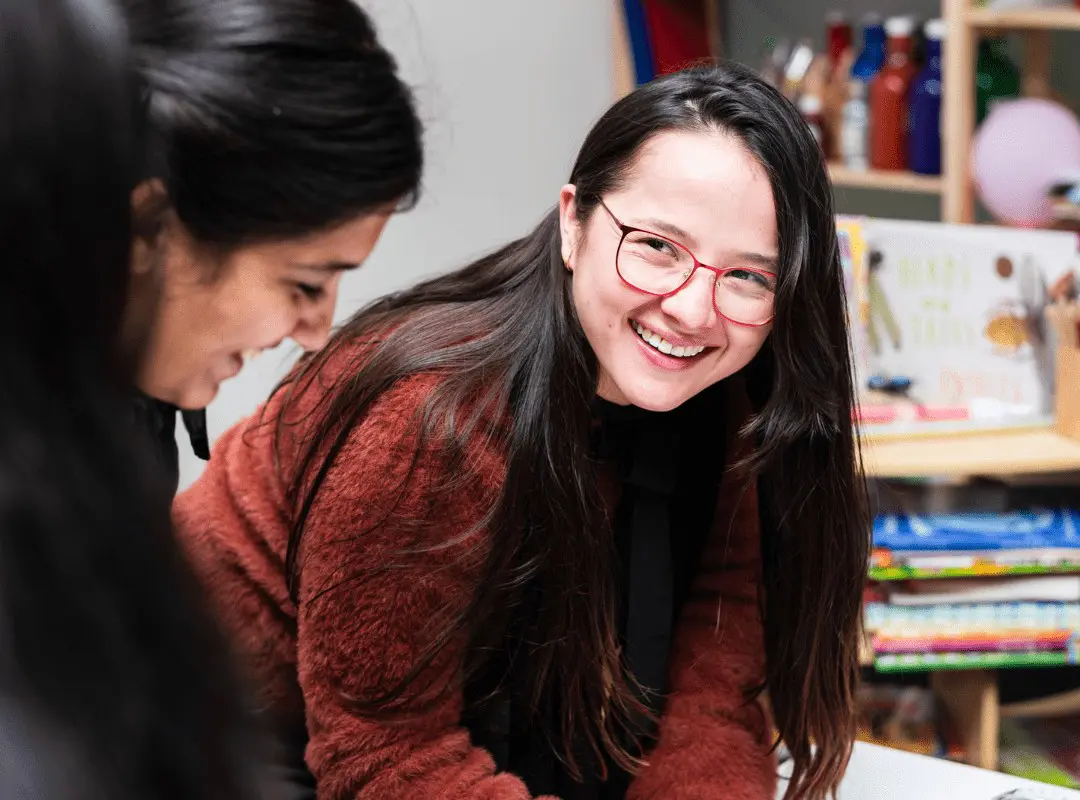Course Overview
Gain basic counselling skills. Gain practical skills in counselling that can be applied in personal and workplace settings upon graduating.
Our Graduate Certificate in Counselling provides you with basic counselling skills. You will develop practical skills in client-centred practice to begin to navigate the complexities of human emotions, identity, and self-concept, enabling you to address clients’ needs effectively.
You will explore therapeutic practice, human development and ethics to begin to consider the factors that impact a person’s mental wellbeing.
Graduate Certificate qualifications do not qualify for membership with Australian Counselling Association (ACA).
This qualification is FEE-HELP approved for eligible applicants.
Key Information
| Award | Graduate Certificate in Counselling |
| Duration | 6 Months Full Time |
| Study Mode | Blended (Online and On-Campus) |
| Locations | Adelaide (From T2 onwards) Brisbane Melbourne or Sydney (Intensives) Online |
| Intakes | February, May, September |
| Course Fees | Domestic (FEE-HELP available) International |
Trimester 1, 2026 Applications Extended Due To Popular Demand
Career Opportunities
Graduates are prepared for roles as:
- Supportive counsellors
- Mental health support staff
- Community health workers
- Case managers in diverse settings such as:
- Schools
- Community health centres
- Social service agencies
- Employee assistance programs
- Non-profit organisations

Course Structure
The Graduate Certificate in Counselling comprises 4 equally weighted subjects of 6 credit points each (total of 24 credit points) delivered over 8 months.
A typical study load is 2 subjects per trimester over 2 trimesters. Each trimester consists of twelve weeks.
Delivery & Workload
Course delivery for the Graduate Certificate in Counselling is a combination of lectures, tutorials, discussions, assessment activities and independent study.
Online delivery involves live online sessions where students engage with lecturers and peers in real-time interactions, closely simulating the dynamics of on-campus learning. Face-to-face delivery includes an on-campus intensive for the following subject:
COU502 Foundations of Therapeutic Practice
This intensive is only available at the Melbourne and Sydney campus and will provide students with hands-on skills practice, supervised clinical simulations, and valuable interactions in a face-to-face learning environment.
You should allow a notional 12 hours per week for each subject studied. You should then spend approximately 26 hours per week for self-directed study to complete prescribed readings, practice skills, research, study and complete assessments.
Subjects
Year 1
This subject examines the major paradigms in counselling and psychotherapy, and their theories of therapeutic change. Students will study models from the psychodynamic, humanistic, cognitive-behavioural, constructivist postmodern and transpersonal approaches, examining their underlying theories, therapeutic processes, and techniques. A core focus is the examination of the mechanisms of change within each approach. Students will examine the common factors that underpin effective therapeutic practice while recognising the unique aspects of each approach to facilitate change. In evaluating the strengths and limitations of different therapeutic approaches, students will gain a nuanced understanding of their applicability and limitations in different and diverse contexts.
The subject also explores the integration of different approaches, fostering an appreciation for the potential synergies and challenges that arise from an integrated therapeutic framework. Additionally, students will embark on a journey of self-reflection as they start to develop their own personal approach to counselling and psychotherapy practice, anchored in their unique strengths, values, and therapeutic philosophy.
Subject Code: COU501
Credit Points: 6
Assessments: Online Quiz (30%), Critical Comparison Essay (40%), Reflective Essay (30%)
This subject is designed to develop the skills needed to build a strong therapeutic relationship with clients, apply self-reflective and client-centred practice, and the use of more advanced counselling skills to facilitate change. Through observation, imitation of master practitioners, practice in triads, debriefing and reflecting on practice students will learn to facilitate fundamental counselling skills as well as advanced empathy, attunement, therapeutic presence and the application of other advanced counselling skills.
The relationship between different counselling theories and skills will also be discussed. Students are guided to explore therapeutic presence and engagement as a foundation for their work. The difference between the therapeutic relationship with ‘relational depth’ and the ‘therapeutic alliance’ will also be explored. The central activity is the experiential practice of therapeutic skills in one-to-one therapeutic interactions with lecturers and peers where students will share and work with their own ‘lived experience’ in sessions. At successful completion of this subject, students will have gained a suite of holistic counselling skills to facilitate supportive counselling and a strong foundation for the specialised practice skills that follow in the Graduate Diploma and Masters Degree.
Subject Code: COU502
Credit Points: 6
Assessments: Triad Participation & Skills Demonstration (30%), Skills Demonstration & Self-Evaluation (50%), Peer Observation & Reflection (20%)
This subject is designed to foster awareness and understanding of ethical issues fundamental to ethical and culturally sensitive counselling practice. Students will gain knowledge of the principles, frameworks and approaches that can guide ethical decision making, including legislation and codes of conduct within the Australian professional landscape.
The subject emphasises the importance of understanding ethical principles from a range of philosophical positions, such as relational ethics, ethics of caring, and virtue-based ethics. Students will be challenged to integrate these ethical principles with codes of ethics to address ethical dilemmas. Students will also acquire the skills to apply ethical principles, codes, and frameworks to propose ethical and culturally sensitive solutions to common scenarios encountered in clinical practice, using contemporary case scenarios as a basis for analysis. The subject also encourages critical reflection on the connections and potential tensions between their own personal and professional values and how these may influence their behaviour, practice and decision making.
Subject Code: COU503
Credit Points: 6
Assessments: Case Scenario Logbook (30%), Case Analysis Report (40%), Reflective Essay (30%)
This subject offers an advanced exploration of human development across the lifespan through the developmental perspective. Grounded in developmental theories, contemporary research, and the developmental stages from prenatal to late adulthood, students will examine the biological, familial, psychosocial, and environmental factors that shape optimal human functioning. Central to this exploration is the application of this knowledge to therapeutic practice, ensuring that students can draw upon these insights in real-world settings to foster resilience and facilitate personal growth in their clients. Beyond theoretical understanding, students will engage in self-reflection to comprehend the impact of their own developmental journey on both their personal growth and their professional practice.
Subject Code: COU504
Credit Points: 6
Assessments: Academic Poster (30%), Case Analysis Essay (40%), Reflective Essay (30%)

Recognition of Prior Learning
At Ikon, your past studies or work experience can be acknowledged through Recognition of Prior Learning (RPL) or Credit Transfer. RPL evaluates your previous skills and experience against the learning outcomes of Ikon subjects, potentially exempting you from studying certain subjects. Credit Transfer allows your previous studies to contribute towards your qualification, granting credits based on matched content and learning outcomes between equivalent qualifications. These pathways could help you to fast track your qualification, reducing study time and tuition fees. The maximum number of subjects for which credit may be granted is 50% of the total award credit points.
Study Pathways
Students may continue into the Graduate Diploma of Counselling and Psychotherapy or the Master of Counselling and Psychotherapy consisting of the following subjects.
COU505 Understanding Mental Health
COU506 Emotion, Affect and Self in Psychotherapy
COU507 Unravelling the Concept of Mind
COU508 Process Experiential Psychotherapy
Graduate Diploma of Counselling and Psychotherapy
COU509 Neuroscience of Psychotherapy
COU5010 Navigating Healing in Complex Trauma
COU511 From Assessment to Treatment Design
COU512 Conversational Model of Psychotherapy
COU513 Bridging Mind, Body and Healing in Trauma
COU514 Working with Complex Presentations
COU515 Bringing Research to Life
COU516 Applied Professional Practice
Master of Counselling and Psychotherapy

Entry Requirements
We welcome students from all circumstances and academic backgrounds to apply for this course.
Choose the admission pathway that is most relevant to your educational background.
Qualifications & Prior Learning
English Language Proficiency
Additional Admissions Requirements
The course design follows the admission criteria for the Master of Counselling and Psychotherapy and provides two admission pathways for Graduate Certificate students.
- Admission Pathway 1 (Undergraduate Degree in Any Discipline): Applicants who have successfully completed a Bachelor Degree (or equivalent) in any discipline will commence with the first four subjects that make up the nested Graduate Certificate to obtain the fundamental knowledge and skills that underpins counselling and therapeutic practice.
- Admission Pathway 4 (Professional Experience): Applicants who do not hold a Bachelor Degree but have at least five years FTE experience as a counsellor, psychotherapist or psychoanalyst may be eligible for admission based on their professional experience. Students would commence with the first four fundamental subjects to ensure they have the academic preparation and foundation necessary to succeed in the course. Admission will be considered on a case-by-case basis by the Head of School (or nominee) to determine the applicant’s ability to meet the educational demands of the course.
Applicants with only previous vocational training qualifications, who do not also have ≥5 years FTE professional experience as a counsellor, psychotherapist or psychoanalyst, are not eligible for admission.
Applicants with only recent senior secondary education are not eligible for admission.
All students need appropriate English language skills to participate and complete the requirements of their course of study. Applicants whose first language is not English must evidence they meet the minimum English proficiency requirements for admission. English proficiency can be evidenced by one of the following:
- Undergraduate degree or postgraduate award where English was the language of instruction; or
- An English language proficiency test achieving an IELTS Academic Overall Score of 6.5 (or equivalent) with Speaking no less than 6.5 and Listening, Writing and Reading no less than 6.0.
Applicants seeking admission based on prior qualifications must provide certified academic transcripts of their completed qualifications, and a completed admission questionnaire.
Applicants seeking admission based on professional experience must provide a curriculum vitae clearly detailing their roles, duties and duration of positions, a statement of service on employer letterhead (or accountant or solicitor if self-employed), and a completed admission questionnaire.
All applicants should read the course inherent requirements to ensure they are able to meet them.
Applicants may be asked to participate in an interview to determine suitability for the program.
Find Out More!
Complete the form below to download our course brochure and find out more about the Graduate Certificate in Counselling.

